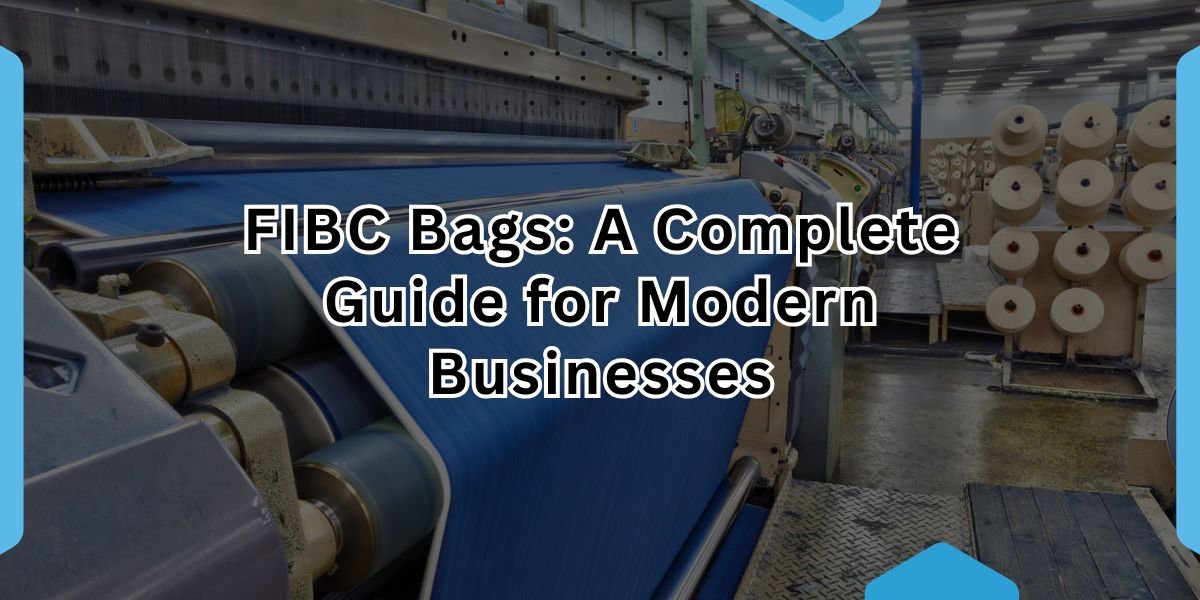In today’s global supply chain, packaging plays a crucial role in ensuring safe, cost-effective, and efficient transportation of goods. Among the many packaging solutions available, Flexible Intermediate Bulk Containers (FIBC bags) stand out as one of the most reliable and versatile options. Commonly known as bulk bags, big bags, or jumbo bags, are designed to store and transport large quantities of dry, flowable products with ease.
Whether it’s agriculture, chemicals, construction, or food industries, FIBC bags have become an indispensable choice for businesses across the world.
What Are FIBC Bags?
FIBC bags are large, flexible containers made from woven polypropylene fabric. They are primarily used for storing and transporting dry bulk materials such as grains, seeds, fertilizers, cement, sand, and plastic granules. Depending on the design, they can carry anywhere from 500 kg to 2000 kg of material in a single bag.
Their sturdy construction, lightweight nature, and ability to handle heavy loads make them an efficient alternative to traditional packaging methods.
Types of FIBC Bags
Different industries have different requirements, and FIBC bags are designed in multiple styles to meet these needs. The major types include:
- Standard FIBC Bags – Commonly used for general bulk products.
- Baffle Bags – Designed with inner panels to maintain a square shape and maximize space in transport.
- Conductive (Type C) Bags – Prevent static charge buildup, ideal for flammable materials.
- Dissipative (Type D) Bags – Safe for environments where grounding is not possible.
- Food-Grade FIBC Bags – Manufactured under strict hygiene standards for food and pharmaceutical applications.
- UN-Certified Bags – Specially tested for transporting hazardous materials.
Key Benefits of FIBC Bags
Businesses choose these bags for a reason—they bring multiple advantages that traditional packaging cannot match:
- High Load Capacity – Capable of handling up to two tons of material in a single bag.
- Cost-Effective – Lightweight and reusable, reducing overall packaging and transportation costs.
- Space-Saving Design – Baffle bags and stackable designs maximize storage and container space.
- Customizable – Available in different sizes, shapes, and with add-ons like liners, coatings, or discharge spouts.
- Environmentally Friendly – Reusable and recyclable, supporting sustainable business practices.
- Safe Handling – Equipped with lifting loops for forklifts and cranes, ensuring smooth loading and unloading.
Applications of FIBC Bags
The versatility of FIBC bags makes them suitable for a wide range of industries:
- Agriculture – Transporting grains, seeds, fertilizers, and animal feed.
- Construction – Handling cement, sand, gravel, and other raw materials.
- Chemicals & Minerals – Storing powders, resins, and industrial raw materials.
- Food Industry – Safe packaging of flour, coffee, sugar, starch, and additives.
- Pharmaceuticals – Hygienic transport of bulk powders under food-grade standards.
- Recycling Industry – Collecting and moving scrap materials, plastics, and waste.
Why Businesses Prefer FIBC Bags
In a competitive marketplace, efficiency is everything. Companies prefer them because they:
- Reduce packaging waste compared to small sacks.
- Minimize manual labor by allowing bulk handling.
- Optimize container loading, reducing freight costs.
- Provide safety and reliability during long-distance shipments.
For companies managing large volumes of raw materials, switching to FIBC bulk bags can translate into significant savings and smoother operations.
Choosing the Right FIBC Bag Manufacturer
Not all FIBC bags are created equal. The right manufacturer ensures quality, durability, and compliance with safety standards. When selecting a supplier, businesses should look for:
- ISO and international certifications
- Custom design capabilities
- Food-grade or UN-certified options (if required)
- Strong quality control processes
- On-time delivery and global logistics support
The Future of FIBC Bags
With growing demand for sustainable packaging and efficient logistics, FIBCs are set to remain a preferred solution worldwide. Advances in fabric technology, improved safety standards, and eco-friendly production processes are making them even more valuable for businesses seeking long-term, cost-effective solutions.
Conclusion
FIBC has revolutionized bulk packaging by offering strength, flexibility, and efficiency. From agriculture to chemicals and construction to food, their adaptability makes them the backbone of modern supply chains.
If your business deals with bulk materials, investing in high-quality FIBC bags is not just a choice—it’s a smart strategy for cost savings, safety, and sustainability.
